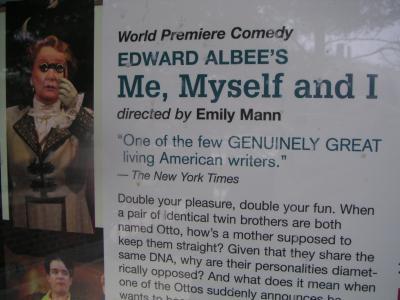Eduard Albee: "Me, Myself and I"

Edward Albee once called his work "an examination of the American Scene, an attack on the substitution of artificial for real values in our society, a condemnation of complacency, cruelty, and emasculation and vacuity, a stand against the fiction that everything in this slipping land of ours is peachy-keen."
That would be equally valid for the recent debut of his “Me, Myself and I,” at Princeton’s McCarter theatre. In the program he “explains:”
“I tend to become uncooperative—and occasionally downright hostile—when people ask me what my plays ‘are about,’ especially the new ones, about which I’ve usually not assembled a provocative yet vague enough short paragraph to avoid answering the question, yet seeming to.
“What is ‘Me, Myself and I’ about? Oh, about 2 hours, including intermission. Will that do? No; I guess not, though I do like it as an answer, for any play that can be explained (or properly described) in the desired sentence or two should be no longer than its description. A play is, after all, about everything that happens to the characrters from the beginning of the play to the end and (unless the author has killed them all off by curtain) the characters’ lives before the play begins and after it ends.”
The fellow seated next to this writer during the January 21 performance, seemed a bit wary of what was about to happen:
“I ain’t got no twin brother, so I just don’t know, but I’m damn glad I don’t.”
Silence. The curtain reveals Thomas Lynch’s very simple and effective set design: an almost empty stage, thread thin golden columns, a light blue back drop and a bed temporarily housing the mother (Tyne Daily) and the doctor ((Brian Murray).
You get a pretty good idea that there’s going to be a search for identity when one of the twins (Machael Esper and Colin Donnell) appears and the mother wants to know who he is.
“Don’t you know?”
And then: do you love me? Hate me?
One of the twins is typically the ‘good boy,’ the other the ‘bad boy,’ one wants to flee home, become Chinese, one doesn’t want to recognize the other, one has a sweet and pretty girl friend, Maureen (Charlotte Parry) and that’s where things get really ‘complicated,’ or opague, in Albee’s opinion. The ‘bad’ Otto takes advantage of the confusion of identities to make love to her, but then the other Otto, the girl’s real girl friend arrives…
By that time the fellow next to me was gritting his teeth.
“Woh! That’s too much! If that happened to me I’d kill the bastard!” Then he rushed off, as soon as the applause had died down. I presume he was talking ‘metaphorically!’
Later, over coffee, the following weekend, or whenever, you might well get your gang together and chat about how often there are mixed up roles in families, how love is blurred over with rejection or even hate, how little words and trifles suddenly burst into rife of the first degree…
0 comentarios